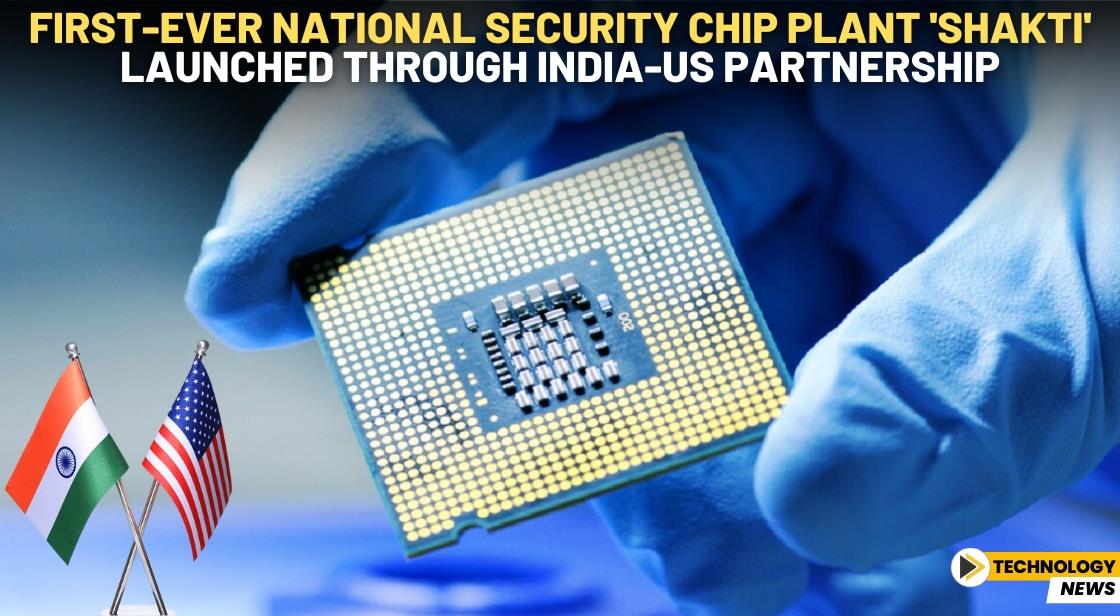First-Ever National Security Chip Plant 'Shakti' Launched Through India-US Partnership

News Synopsis
In a monumental step for India’s technology and national security landscape, Prime Minister Narendra Modi and US President Joe Biden jointly announced the establishment of India's first national security semiconductor fabrication plant, named ‘Shakti.’ This groundbreaking initiative marks the first-ever collaboration between India and the United States in chip manufacturing for military hardware, critical telecom systems, and advanced electronics. With its cutting-edge focus, 'Shakti' is set to revolutionize India's capabilities in producing semiconductors essential for national defense and advanced industrial applications.
What is 'Shakti'?
The 'Shakti' semiconductor fabrication plant is a game-changing project aimed at addressing three critical technology areas:
-
Advanced Sensing: Enabling the development of sophisticated sensors for military and industrial use.
-
Advanced Communications: Powering next-generation communication systems, including those for secure military operations.
-
High-Voltage Power Electronics: Developing semiconductors crucial for powering advanced military equipment, as well as applications in railways, telecom infrastructure, and green energy.
Through these technologies, 'Shakti' will not only bolster India's defense sector but will also serve growing industries such as railways, data centers, and green energy solutions. The fab is set to manufacture highly specialized semiconductors like infrared, gallium nitride (GaN), and silicon carbide (SiC), materials essential for modern warfare and critical industrial operations.
The Strategic Partnership Behind 'Shakti'
The 'Shakti' project is part of a broader strategic technology partnership between India's Bharat Semi, 3rdiTech, and the United States Space Force. Supported by the India Semiconductor Mission, this partnership makes the Shakti fab one of the world's first multi-material semiconductor plants solely dedicated to national security.
Indian Foreign Secretary Vikram Misri emphasized the importance of this collaboration, calling it an "enormously encouraging development" for India's semiconductor sector. He stressed that the partnership between India and the US is a significant step forward for both countries, especially in light of national security considerations. The initiative positions India as a vital player in the global semiconductor landscape, reducing its reliance on foreign imports for high-security components.
A ‘Watershed’ Moment in India-US Relations
Both Prime Minister Modi and President Biden have hailed the collaboration as a “watershed arrangement,” comparable to the historic Indo-US civil nuclear deal. This is the first time the US military has partnered with India on such a high-value technology initiative, which is expected to elevate India's standing among nations capable of producing these critical components. The development could reduce India's annual import bill for national security semiconductors, which currently stands at around ₹8,303 crore (approximately $1 billion).
The Shakti fab is aimed at establishing a trusted and stable supply chain for India’s national security technologies. By creating a local manufacturing hub, India will be able to meet its semiconductor demands while reducing its dependence on global suppliers—a significant move toward self-reliance in critical tech sectors.
Impact Beyond National Defense
While the primary focus of the Shakti fab is national security, its potential impact stretches far beyond defense. Industries such as telecommunications, railways, and green energy are poised to benefit from the advanced semiconductors produced at the plant. As global industries shift toward more secure and advanced technologies, the demand for chips like those manufactured at Shakti is expected to grow exponentially.
These sectors are already experiencing rapid growth in India and globally, and the Shakti fab will play a key role in meeting the rising demand for cutting-edge semiconductors. The use of gallium nitride and silicon carbide semiconductors in green energy applications will be particularly beneficial for India’s renewable energy goals, adding another layer of importance to the project.
Strengthening Semiconductor Supply Chains
The establishment of the Shakti fab is just the beginning of a broader effort to strengthen semiconductor supply chains between India and the United States. In addition to the Shakti plant, Modi and Biden discussed further cooperation in bolstering semiconductor infrastructure. GlobalFoundries (GF) is already expanding its presence in India, with the GF Kolkata Power Centre taking the lead in semiconductor development. This center will support India's efforts in becoming a global hub for power semiconductors.
Additionally, India and the US are working to strengthen their collaboration in next-generation telecommunications technologies like 5G. The US Agency for International Development (USAID) has committed ₹58 crore ($7 million) to expand the Asia Open RAN Academy, a move aimed at fostering innovation and expertise in open radio access networks (Open RAN) for telecommunications.
A New Chapter in India-US Technology Relations
The Shakti fab is a major milestone in India-US technology relations, marking the start of deeper collaboration in strategic tech sectors. By building on their partnership, both nations are set to push forward their mutual interests in secure semiconductor supply chains, advanced communications, and next-gen defense technologies.
This collaboration is expected to make India a global player in semiconductor manufacturing, putting the country on the path to becoming a major hub for critical technology solutions. With projects like Shakti and companies like GlobalFoundries expanding their operations in India, the nation is poised to be at the forefront of global technological advancements, particularly in national security and defense sectors.
the Shakti semiconductor fabrication plant represents a transformative moment for India's tech sector. Its collaboration with the United States signals the beginning of a new era in semiconductor manufacturing, with far-reaching implications across defense, telecom, and green energy industries. This strategic partnership is set to define the next chapter of India’s role in the global semiconductor ecosystem.
You May Like









